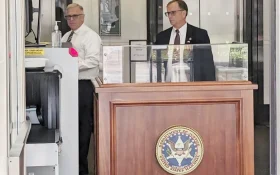Phil Schiller, a longtime Apple executive, admitted in court on Wednesday that the court-ordered changes to the U.S. payment system in the iPhone app store haven’t significantly increased competition.
This shortcoming could lead to a federal judge demanding further changes to the app store’s payment system.
Schiller, who has been in charge of the iPhone app store since its launch in 2008, made the admission during his testimony about the new payment options introduced in January. Despite being available for several months, only a few dozen apps have adopted these alternative payment methods.
The ongoing hearings, held in Oakland, California, federal court, are aimed at determining whether Apple is properly following an order issued as part of an antitrust case. The case, brought by Epic Games, alleged that Apple’s iPhone app store had become an illegal monopoly. Although U.S. District Judge Yvonne Gonzalez Rogers rejected the monopoly claims, she ordered Apple to lower the barriers protecting its previously exclusive payment system and allow developers to display links to alternative options.
This change poses a threat to Apple’s lucrative in-house payment system, which generates billions of dollars annually through commissions ranging from 15% to 30% on digital transactions completed within iPhone apps. After more than two years of unsuccessful attempts to overturn the order, Apple finally complied in January by setting up an application process to approve links to alternative payment systems and imposing fees of 12% to 27% when users clicked on those options.
Epic, the creator of the popular video game Fortnite, argued that Apple’s commissions for clicking on external payment links, combined with other payment processing costs, make the alternative more expensive than using Apple’s standard system. In response to Epic’s objections, Judge Gonzalez Rogers is now considering holding Apple in contempt of her order and taking more drastic actions to give consumers more payment choices and foster competition that could lower prices.
Throughout the hearings, Judge Gonzalez Rogers has expressed frustration with Apple executives and questioned whether the company is primarily focused on preserving its profit margins and corralling most payments to its in-house system. Schiller defended Apple’s response to the judge’s order as well-intentioned, aiming to allow more competition while protecting user privacy and security. However, he struggled to explain why so few iPhone apps are seeking approval for external payment links.
As the hearings continue, with Schiller set to return to the witness stand on May 31, the future of Apple’s app store payment system hangs in the balance.
The outcome of these proceedings could have significant implications for the tech giant’s revenue and the way developers and consumers interact with the iPhone app store.
The Associated Press contributed to this article.
